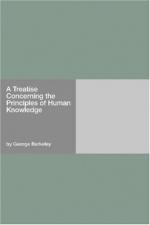127. Because there is no number of parts so great but it is possible there may be a line containing more, the inch-line is said to contain parts more than any assignable number; which is true, not of the inch taken absolutely, but only for the things signified by it. But men, not retaining that distinction in their thoughts, slide into a belief that the small particular line described on paper contains in itself parts innumerable. There is no such thing as the ten—thousandth part of an inch; but there is of a mile or diameter of the earth, which may be signified by that inch. When therefore I delineate a triangle on paper, and take one side not above an inch, for example, in length to be the radius, this I consider as divided into 10,000 or 100,000 parts or more; for, though the ten-thousandth part of that line considered in itself is nothing at all, and consequently may be neglected without an error or inconveniency, yet these described lines, being only marks standing for greater quantities, whereof it may be the ten—thousandth part is very considerable, it follows that, to prevent notable errors in practice, the radius must be taken of 10,000 parts or more.
128. Lines which are infinitely divisible.—From what has been said the reason is plain why, to the end any theorem become universal in its use, it is necessary we speak of the lines described on paper as though they contained parts which really they do not. In doing of which, if we examine the matter thoroughly, we shall perhaps discover that we cannot conceive an inch itself as consisting of, or being divisible into, a thousand parts, but only some other line which is far greater than an inch, and represented by it; and that when we say a line is infinitely divisible, we must mean a line which is infinitely great. What we have here observed seems to be the chief cause why, to suppose the infinite divisibility of finite extension has been thought necessary in geometry.
129. The several absurdities and contradictions which flowed from this false principle might, one would think, have been esteemed so many demonstrations against it. But, by I know not what logic, it is held that proofs a posteriori are not to be admitted against propositions relating to infinity, as though it were not impossible even for an infinite mind to reconcile contradictions; or as if anything absurd and repugnant could have a necessary connexion with truth or flow from it. But, whoever considers the weakness of this pretence will think it was contrived on purpose to humour the laziness of the mind which had rather acquiesce in an indolent scepticism than be at the pains to go through with a severe examination of those principles it has ever embraced for true.




